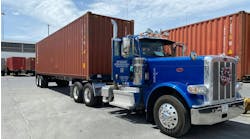Driver shortages, high fuel prices, changes in diesel fuel formulation, an impending switch to more expensive exhaust emission control technology top the list as the biggest challenges to the trucking industry, transportation experts say.
“We need to get out there and find drivers,” said Barry Pottle, CEO of Maine-based Pottle Transportation and the new chairman of the Truckload Carriers Assn. “We were 20,000 short this year [2005] alone. So focusing on driver lifestyle changes is going to be critical to our recruiting and retention efforts in the future. We can’t get drivers if they can’t make a decent living.”
“It’s going to be much harder to find and recruit drivers in 2006 because pay and home time are up at most carriers now,” added Dale Lawless, president of Lowell, AR-based consulting firm LPS Inc. “I think small companies are going to able to recruit and retain drivers just like the big truckload carriers because it’s really going to boil down to the complete package that gets offered to the driver – not the size of the fleet.”
The owner-operator population is going to continue to shrink, he said, noting that the trend has been going on for the last four to five years due to the rising cost of trucking expenses. But that doesn’t mean fleets won’t be able to find and keep good independents, he added. The trick to keeping them is offering benefits beyond just increased pay and home time, along with treating them as business partners-- not just truck drivers.
“First, it’s increasingly the little things that matter,” Lawless said. “Fleets are paying more and offering more regional runs, so drivers aren’t out on the road three weeks at a time. Now they can be out as little as 10 days. What is going to make the difference are things like paying fuel taxes, passing through fuel surcharges, paying for registration and base plates. Fleets must put a whole package on benefits together going forward-- not just pay raises.”
Rising fuel prices, the impending changeover to ultra low sulfur diesel (USLD) by late 2006, and the introduction a price premium (between $7,000 to $10,000 for Class 8 tractors) for new emission control technology for trucks in 2007 are worrying fleets as well.
“With higher fuel prices, we are now in an untenable position with many customer fuel surcharge programs,” said Clarence Werner, chairman, president and CEO of Omaha, NE-based Werner Enterprises. “And the recent hurricanes [Katrina and Rita] caused a shortage of refined product that escalated diesel fuel prices, while crude oil prices did not increase significantly.
“That, in turn, showed a weakness in the truckload industry’s fuel surcharge standard of a one-cent per mile increase in rate for every five-cent per gallon increase in the Dept. of Energy fuel price that is used for most fuel surcharge programs,” he added. “This weakness is due to the fact that five-cent per gallon brackets only recoup about 80% to 85% of the actual increase in the cost of fuel.”
“It’s been 25 years since we’ve built a new refinery in this country and we’re suffering a major [fuel production] capacity strain as a result,” noted Pottle. “We have 25 refineries that produce 54 different grades of gasoline and three types of diesel fuel now. We need to reduce that number so there aren’t more hiccups in our fuel supply.”
Werner noted that fuel costs could get worse when the industry switches to ULSD. “When truckload carriers are required to use new ULSD for all of their existing trucks, preliminary estimates are the new fuel may decrease mpg by approximately 1% to 3%,” he said.
The potential fuel economy degradation from ULSD combined with an estimated 1% degradation from 2007 engines creates a real concern– especially in view of Werner’s experience with 2002 engines. “Right now, the percentage of our truck fleet with post-October 2002 engines is 76% and we continue to experience approximately 5% lower miles-per-gallon with them,” he said.
Yet despite those challenges, trucking is playing an ever more critical role in the nation’s economic infrastructure than ever.
“The importance of the motor carrier industry to our economy cannot be understated – and it’s important that this industry remain viable, secure, safe, and continue to grow,” said Rodney Slater, former secretary of transportation under President Clinton and currently a partner in the Washington D.C. law firm of Patton Boggs LLC.
“The motor carrier industry used to be viewed as an aside to the concept of supply chain management, but now we realize it’s an integral part of it,” he added. “[Trucking] is a tie that binds not only our economy together, but our nation to those of our NAFTA trading partners [Canada and Mexico] and the world as well.”



